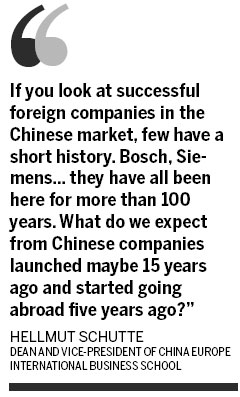Global expansion: Too fast?
Updated: 2013-10-08 07:31
(China Daily)
|
|||||||||||
Management | Zheng Yangpeng
Going international takes pain and patience, says CEIBS dean
The past few years have seen an extraordinary crusade for Chinese companies into overseas market. Newspapers are filled with stories about how Chinese firms built their global presences by buying up foreign firms, patents and brands. The government has also encouraged this endeavor. But Hellmut Schutte, dean and vice-president of China Europe International Business School, raises a question: Is it happening too fast? Why not stop for a while and rethink things?
The core argument of the professor of international management, who has lived in Asia for many years, is that too few Chinese firms have thought of "comparative advantage", an indispensable component for international competition, before they buy a foreign firm.
"So long as you do not give your customers a reason why they should buy your products and services, you will not be successful," said Schutte.
People in favor of rapid overseas expansion might rebuke that buying foreign firms just serves as the most convenient way to acquire advanced technologies and recognized brands, elements that constitute the "comparative advantages". But, Schutte argued, if advanced technologies is the goal, why not buy machineries or bring in engineers, a much more easy option? If branding is the goal, do you have the ability to manage the brand after buying it? Can you manage the foreign managers who manage the brands?
 |
When you acquire a company, Schutte argued, you generally pay a premium, which means your investment is higher than before. So, if you want to have a return, you have to be better than before. But the question is, what can assure you that you would be better at managing the company, which had been in trouble before you bought it?
"I know it is quite tempting to buy up European companies now because the price is low. But at the very end you have to be able to manage them better than beforehand. You have to get something attractive to offer to that market," he said in an interview with China Daily.
He noted that very few foreign companies come to China and conclude a deal within a few weeks. On the contrary, they do a lot of work: hiring local senior managers, paying consultants and so on.
"If you look at successful foreign companies in the Chinese market, few have a short history. Bosch, Siemens they have all been here for more than 100 years. What do we expect from Chinese companies launched maybe 15 years ago and started going abroad five years ago?" he asked.
If you really want to enter the United States or France, Schutte said, why not bring in some Americans and French to work for you? Why not send a few people out there? "It does not have to be a chairman for one week, but junior members for one year," he said.
In this respect, Chinese companies should really learn from Huawei Technologies Co Ltd, a case in Schutte's eyes, that is heading in the right direction for internationalization.
"It (Huawei) has built up its experience and competitiveness around the world very slowly and solidly, one step after another. They have done a good job in learning about other markets. They have developed a comparative advantage there and they have really good products," he said.
Another example is Sany Heavy Industry Co Ltd, the Hunan-based construction machinery manufacturing giant that bought German firm Putzmeister Holding GmbH last year. Sany basically adopted a "hands-off" approach after the acquisition and did not require it to deliver profits immediately.
"This is because of a clear realization that in the short-term Sany has nothing to offer to Putzmeister outside China. Very few corporate leaders have this realistic view of their capabilities," said Schutte, adding at the end the Sany leader still have to comprehend what in particular it can offer the German company.
Another question that Schutte has frequently been asked is: "Must Chinese companies go global?" After all, a considerable number of small Chinese firms prosper in the local market because they are better acquainted with it.
His view is that local companies can always be better off in the home market by learning foreign competitors' best practices. In an ever more globalized world, competition increasingly comes from outside and there are very few industries that are purely domestic now. Being extrovert risks falling behind.
"Who guarantees you that as a domestic firm you always know your customers better than foreign firms? This is an 'assumption'," Schutte said.
"For example, the cosmetics market is an area that is highly culturally sensitive. But look at China's cosmetics market: The top eight companies are foreign firms. Li-Ning Co Ltd, a domestic sportswear brand, also lags behind Nike Inc and Adidas AG. The reasons could be that the two foreign competitors have accumulated so much experience in other markets that they can handle any market. They've seen it all," he said.
Going truly international, he constantly repeated, is a painful experience that many Chinese companies have underestimated.
"It is so much more comfortable to be at home. If I live abroad, it can be uncomfortable. It's always learning, always surprising. If I stay in my village, it is wonderful, although not that interesting. But you have to move out of your comfort zone," he said.
So the basic information is that Chinese companies should be patient?
"Patience does not mean they should do nothing about it. One of the challenges is you have to in a sense forget China is the benchmark for what you are doing," Schutte said.
"If you are really ambitious, you should always set the benchmark to be the international norm. If you don't do that, going abroad will be always a shock."
(China Daily 10/08/2013 page17)
Today's Top News
Global expansion: Too fast?
China, Russia co-work for security in Asia-Pacific: Xi
Animal welfare to be added in training
Talks 'can help Chinese banks' in UK
Robust home sales during holiday
APEC 'should take lead' in FTA talks
Beijing targets polluting cars
China warns US, Japan, Australia over sea issues
Hot Topics
Lunar probe , China growth forecasts, Emission rules get tougher, China seen through 'colored lens', International board,
Editor's Picks

|

|

|

|

|

|





